|
|
|
Sort Order |
|
|
|
Items / Page
|
|
|
|
|
|
|
| Srl | Item |
| 1 |
ID:
151000
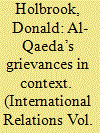

|
|
|
|
|
| Summary/Abstract |
At a time when political debate in the West is preoccupied with the perceived impact of extremist ideas on individuals who embrace or support terrorism, this article uses the publicly articulated grievances of Ayman al-Zawahiri, Al-Qaeda’s most prolific ideologue, as a case study to examine how a globally focused and distributed extremist narrative matches political realities on the ground. The approach of the article is to compare two political processes: the approach of Islamist extremists, as represented by Zawahiri, to constitutional reform as articulated through public appeals to potential supporters versus the reality of constitutional amendments and evolution of fundamental law in the Middle East and South Asia. Incorporating insights from studies on law and society and International Relations, the article demonstrates how Zawahiri’s interpretation of religious law emphasises wholesale adoption of sharia while the process of legal reform has invariably resulted in the creation of legal hybrids, mixing Islamic and non-Islamic legal traditions. This is not an article about theology or religious law but an effort to dissect the public relations of an international terrorist movement. The analysis pays particular attention to events in Zawahiri’s native Egypt, where evolving grievances concerning a series of constitutional amendments – including those following the Arab revolutions and the toppling of Mohammed Morsi – are assessed.
|
|
|
|
|
|
|
|
|
|
|
|
|
|
|
|
| 2 |
ID:
152261


|
|
|
|
|
| Summary/Abstract |
Brunei continued in 2016 to suffer from declining oil and gas prices. The budget deficit grew. The Sultan made economic diversification and “prudent spending” the year’s central political themes. He criticized several government institutions during “surprise visits” and sharply attacked the Ministry of Religious Affairs for “delaying” the full enforcement of an Islamic legal reform.
|
|
|
|
|
|
|
|
|
|
|
|
|
|
|
|
| 3 |
ID:
145448


|
|
|
|
|
| Summary/Abstract |
The oil price decline of 2015 caused significant losses for Brunei’s economy. The country is still preparing the second phase of its Sharia reform that began in 2014. In addition to his other government positions, Sultan Hassanal Bolkiah appointed himself as minister of foreign affairs and trade, replacing Prince Mohamed Bolkiah.
|
|
|
|
|
|
|
|
|
|
|
|
|
|
|
|
| 4 |
ID:
124487
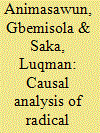

|
|
|
|
|
| Publication |
2013.
|
| Summary/Abstract |
This article attempts an agential explanation of the raison d'être for Jama'atu Ahlis Sunna Lidda'awati wal Jihad, also known as Boko Haram (meaning Western education is forbidden), an Islamist sect that came to public consciousness in 2009 after the extra-judicial killing of its leader. Conceptualising Nigeria as a weak state, the article identifies the failed prebendal relationship between politicians in northern Nigeria and members of Boko Haram, and the extra-judicial killing on 30 July 2009 of Mohammed Yusuf, as agential causations of the current wave of radical Islamism. The article argues for the need to transcend the orthodox interpretation of the current wave of Islamist terrorism being demonstrated by the Nigerian state to a more nuanced approach that pays attention to the essentialist, psychological, political and economic perspectives of Islamist terrorism at the structural and individual levels.
|
|
|
|
|
|
|
|
|
|
|
|
|
|
|
|
| 5 |
ID:
135007
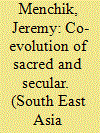

|
|
|
|
|
| Summary/Abstract |
While scholars of the Islamic revival have devoted attention to the increased prominence of Islamic law [the shari'a] in the once-secular public sphere, less attention has been paid to a countervailing trend. By mapping the evolution of Islamic law over the twentieth century, the author demonstrates that the shari'a is a product of decades of negotiations between Islamic institutions and more secular authorities including government ministers, doctors and social movements. This evolution suggests that secular authority and secular forms of knowledge have influenced but not displaced religious authority and religious forms of knowledge. The opposite is also true. This finding raises questions about the binary distinction between secular and sacred authority and suggests the co-evolution of religion and secularism in modern Muslim societies.
|
|
|
|
|
|
|
|
|
|
|
|
|
|
|
|
| 6 |
ID:
118314
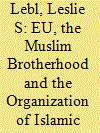

|
|
|
|
|
| Publication |
2013.
|
| Summary/Abstract |
The European Union (EU), the Muslim Brotherhood, and the Organization of Islamic Cooperation (OIC) are locked in a struggle for the future of Europe that encompasses very different visions. The EU aims for a highly sophisticated Western civilization; the Brotherhood and OIC see Europe as part of a future global Caliphate, an Islamic empire governed by an Islamist version of traditional Islamic law, or sharia. This competition extends to the United Nations where the OIC is seeking to enforce global prohibitions on criticism of Islam. A comparison of the EU's actions with those of the U.S. federal government shows that U.S. policymakers, in confronting a similar challenge, are making many of the same errors as their European counterparts.
|
|
|
|
|
|
|
|
|
|
|
|
|
|
|
|
| 7 |
ID:
144329
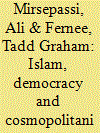

|
|
|
|
|
| Edition |
South Asia ed.
|
| Publication |
DelhI, Cambridge University Press, 2016.
|
| Description |
viii, 225p. pbk
|
| Standard Number |
9781316607985
|
|
|
|
|
|
|
|
|
|
|
|
Copies: C:1/I:0,R:0,Q:0
Circulation
| Accession# | Call# | Current Location | Status | Policy | Location |
| 058621 | 321.80917/MIR 058621 | Main | On Shelf | General | |
|
|
|
|
| 8 |
ID:
167514
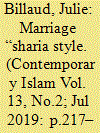

|
|
|
|
|
| Summary/Abstract |
The growing visibility of Islam in the public spaces of Western societies is often interpreted in the media as a sign of Muslim radicalisation. This article questions this postulate by examining the flourishing Muslim marriage industry in the UK. It argues that these ‘halal’ services, increasingly popular among the young generation of British Muslims, reflect the semantic shifting of categories away from the repertoire of Islamic jurisprudence to cultural and identity labels visible in public space. Informed by long-term ethnographic fieldwork in the British field of Islamic law, this article examines a Muslim speed-dating event, which took place in central London in 2013. It investigates how Islamic morality is maintained and negotiated in everyday social interactions rather than cultivated via discipline and the pursuit of virtuous dispositions. Using Goffman’s “frame analysis” and his interpretation of the social as a space of “performances” as well as recent anthropological reflections on “ordinary ethics” (Lambek) and “everyday Islam” (Schielke, Osella and Soares), it examines the potential for such practices to define the contours of a new public culture where difference is celebrated as a form of distinction.
|
|
|
|
|
|
|
|
|
|
|
|
|
|
|
|
| 9 |
ID:
137754
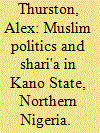

|
|
|
|
|
| Summary/Abstract |
Since 1999, Muslim-majority northern Nigeria has witnessed a new phase of political struggles over the place of Islamic law (shari'a) in public life. This article traces how Muslim politics played into shari'a administration in Kano, northern Nigeria's most populous state, and argues that governmental bureaucracies created for the purpose of administering shari'a became sites of political contests over the meaning of public morality in Islamic terms. Shari'a bureaucracies featured as prizes in unstable political alliances between Muslim scholars and elected Muslim politicians. Politicians' appointments of Muslim scholars to bureaucratic positions, and their empowerment or disempowerment of certain bureaucracies, posed fundamental questions concerning who would control the shari'a project and what its content would be. The manoeuvres surrounding Kano's shari'a bureaucracies reflect broader trends in northern Nigerian politics. The shari'a project has not been a manifestation of Islamism in a narrow sense, but rather the site of a more complex set of intra-Muslim rivalries and electoral competition within an ostensibly secular political system.
|
|
|
|
|
|
|
|
|
|
|
|
|
|
|
|
| 10 |
ID:
166661
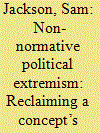

|
|
|
|
|
| Summary/Abstract |
Political extremism suffers from a definitional deficiency. This article proposes an analytical definition of the term, which avoids using extremism in a pejorative way. This definition also avoids exclusive focus on violence. This definition encourages the analyst to explicitly make the case for defining an action or an actor as extremist by comparing the action or actor to its political context. The article then explores several dimensions of an extremist political identity that can help observers understand extremist behavior and goals. It uses this conceptual framework to consider three examples of political extremism. Finally, the article concludes with some limitations and strengths of this definition of political extremism.
|
|
|
|
|
|
|
|
|
|
|
|
|
|
|
|
| 11 |
ID:
132230
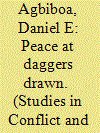

|
|
|
|
|
| Publication |
2014.
|
| Summary/Abstract |
More than 3,500 people have died in Nigeria since 2009 when Boko Haram, a radical Islamist group from northeastern Nigeria, launched its violent campaign to wrest power from the Nigerian government and foist an Islamic state under the supreme law of Sharia. Attempts at negotiating with the group, including the recent amnesty offer extended to its members by the Nigerian government, have stalled due to distrust on both sides and the factionalized leadership of the group's different cells. This article provides a systematic account of Boko Haram's emergence, demands, and modus operandi. It also evaluates how the Nigerian government has responded to the group's threat and how they should respond. The socioeconomic approach of this article helps to explain the Boko Haram problem beyond a usual religious agenda and to evaluate the development of the group in the context of Nigeria's checkered political history and local economic grievances.
|
|
|
|
|
|
|
|
|
|
|
|
|
|
|
|
| 12 |
ID:
177706
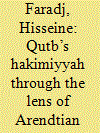

|
|
|
|
|
| Summary/Abstract |
The influence of Sayyid Qutb’s writing on political Islam and Islamist groups cannot be overstated. In constructing his radical political theory, special attention is usually given to Qutb’s two binary concepts, hakimiyyah (usually translated as divine sovereignty) and jahiliyyah (the condition of any place or society where Allah is not held to be the sovereign being). This article interrogates the commonly accepted notion that hakimiyyah is equivalent to divine sovereignty. Instead, I argue that Qutb’s hakimiyyah is best understood as an Arendtian form of authority (or a bounded sovereignty), even though Qutb’s project is essentially foundational while Arendt’s is antifoundational. Thus, rather than appealing directly to the authority of sharia, Qutb bounds hakimiyyah to a historical founding moment in the city of Mecca, the Meccan Quran, and the ‘unique generation’ during this period. Examining hakimiyyah through the Arendtian lens of authority substitutes the logic of sovereignty with authority based on a voluntary command/obedience relationship. This approach unsettles the binary logic of sovereignty that is often latently integrated into the academic literature on Qutb’s political writing. Consequently, examining Qutb’s hakimiyyah through the Arendtian lens of authority generates a consistent and coherent reading of his political thinking, which is usually deemed inconsistent and paradoxical.
|
|
|
|
|
|
|
|
|
|
|
|
|
|
|
|
| 13 |
ID:
111176
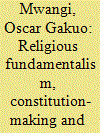

|
|
|
|
|
| Publication |
2012.
|
| Summary/Abstract |
This article examines religious fundamentalism, constitution-making and democracy in Kenya with regard to the arguments surrounding the inclusion of the Kadhis Courts in the country's new Constitution promulgated on 27 August 2010. Kadhis Courts deal with matters of Muslim law and have been entrenched in Kenya's Constitution since the country's independence in 1963. The article argues that the Church and clergy took a fundamentalist position regarding the inclusion of the Courts with the aim of influencing the country's predominantly Christian voters to reject the proposed new constitution at the referendum stage. Kenyans, however, the majority of whom are Christians, overwhelmingly endorsed the constitution. The article underscores that the Church, therefore, lost its moral responsibility and institutional legitimacy as an agent of democracy. The Kenyan experience indicates citizens can ignore religious fundamentalism for the common good of society.
|
|
|
|
|
|
|
|
|
|
|
|
|
|
|
|
| 14 |
ID:
153281
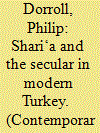

|
|
|
|
|
| Summary/Abstract |
This article discusses the paradoxical relationship of Kemalist state power and traditional Muslim theologians at the beginning of the Turkish Republic. By analyzing the history of a now-commonly accepted argument for change with the Shari‘a, this article proposes that the anxious relationship between state Kemalism and Muslim modernist theologians helped to lay the foundations of mainstream Muslim praxis in modern Turkey. I argue that the supposed conflict between “religious” and “secular(ist)” ideas in Turkey may be better described as a debate over the definition of secularity itself. A concept of the secular is implied in both Kemalist political secularism and Islamic modernism, and these two interact in ways that contribute to each other’s formation. This article will also bring contemporary theorizing on the nature of the “secular” to bear on this question in order to open up new possibilities for the study of Islam in contemporary Turkey.
|
|
|
|
|
|
|
|
|
|
|
|
|
|
|
|
| 15 |
ID:
178928
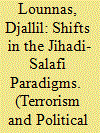

|
|
|
|
|
| Summary/Abstract |
This paper, based on numerous interviews conducted with former jihadists, argues that the emergence of the Islamic State, more than an organizational rift, has led to a major paradigm shift within the jihadi organizations. As such we argue that the Al Qaeda salafi jihadi paradigm, i.e., the “Peshawar paradigm,” has gradually evolved over the years, becoming more in phase with the realities of the battlefield and less dogmatic, explaining this organization’s constant resilience in spite of many setbacks and leading to the rise of a new thinking which we call “the Idelb Paradigm.” Conversely, the ISIS jihadi paradigm, which we call “the Raqqa Paradigm,” stems from the Takfiri school of thought. While not new and already present in the 1980s in Afghanistan, the Takfiri school of thought has been gaining momentum over the years and emerged as a major to the Al Qaeda one. This schism is likely to have a long-term effect on the strategies and alliances of the respective affiliates of both Al Qaeda and ISIS.
|
|
|
|
|
|
|
|
|
|
|
|
|
|
|
|
| 16 |
ID:
129503
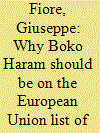

|
|
|
|
|
| Publication |
2014.
|
| Summary/Abstract |
In the course of the last few years, the Islamic sect Boko Haram has become of great interest to academics, researchers and analysts. At the same time, experts, especially at the European Union (EU) level, have been reluctant to include Boko Haram in the EU list of terrorist organisations, despite the fact that this group has clearly demonstrated its transformation into a terrorist organisation. Security challenges and threats are, by definition, subject to change, and it is the task of security institutions to create policies to address these challenges and threats. Terrorism cannot be addressed in isolation, and policymakers are confronted at all levels with the difficult task of making sense of this evolution. By assessing the current security situation in Nigeria, this commentary tries to ascertain the potential repercussions to regional stability from the Boko Haram phenomenon. Insurgencies have often been initiated from and supported by neighbouring countries and have expanded conflicts across borders. Countering Boko Haram will require various institutions to conduct similar and concurrent counter-insurgent and counter-terrorist operations. At the global level, such co-ordination has often proven difficult. The EU has to keep the pace in this case.
|
|
|
|
|
|
|
|
|
|
|
|
|
|
|
|
|
|
|
|
|